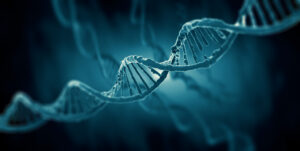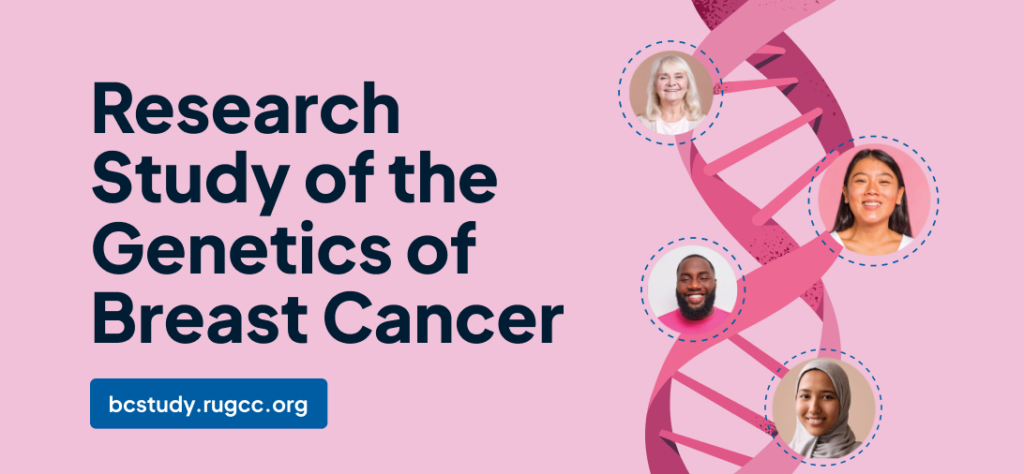Mylie Siegel, Rutgers University, NJ
Genetic Counseling Master’s Student
A pathogenic variant is a difference in a person’s genes that causes that gene to not work properly. While most of the time cancer occurs spontaneously due to chance and non-genetic reasons, up to 10% of breast cancer diagnoses are caused by a known inherited pathogenic variant. Physicians call changes in genes that were not inherited, but caused by chance during a person’s lifetime, “somatic,” as opposed to inherited mutations (sometimes called “germline”). If you have had a genetic test of tissue from a tumor, the physician was looking at somatic variants. Genetic tests based on saliva, on the other hand, are looking at inherited, or germline, variants.
The most common inherited genetic cause of breast cancer is having a pathogenic variant in the BRCA1 or BRCA2 genes. While the overall risk of developing cancer for females is about 13% (1 in 8 women), women with a pathogenic variant in one of these genes have a 55-72% risk of developing breast cancer. Men with a variant in either BRCA1 or BRCA2 have a 0.2-7.1% risk of developing breast cancer, despite the male overall risk of 0.14% (see “The Genetics of Male Breast Cancer”). In addition, people with a BRCA1 pathogenic variant can be at increased risk for ovarian, pancreatic and prostate cancers, while those with a BRCA2 pathogenic variant can be at increased risk for ovarian, pancreatic, prostate, and melanoma cancers.
Since 2013, genetic counselors and other genetics professionals have found that patients show an increased awareness about the risks posed by BRCA1/2 gene variants due to what is called the “Angelina Jolie effect.” In 2013, the famous actress Angelina Jolie announced that she had undergone a preventative double mastectomy due to having a pathogenic variant in the BRCA1 gene. As a result, the genetic testing rates for BRCA1/2 and other cancer-associated genes increased. Over time, many patients have chosen to pursue genetic testing panels that include more cancer-associated genes beyond just BRCA1/2, but public familiarity with the BRCA1/2 genes remains the most common. This article reviews additional high-risk breast cancer-associated genes beyond the BRCA1/2 genes.

PALB2
The PALB2 gene is typically involved with assisting proteins produced by BRCA2. The American College of Medical Genetics and Genomics has called the PALB2 mutation the “third most important breast cancer gene after BRCA1 and BRCA2.” When someone has a pathogenic variant in PALB2, there is a risk of 32-53% for female breast cancer, 0.9% for male breast cancer, 3-5% for ovarian cancer, and 2-5% for pancreatic cancer. Additionally, someone who inherits pathogenic variants in PALB2 from both parents can have a condition called Fanconi anemia, type N. The New York Times had an interesting article about PALB2 and breast cancer, and you can also learn more at FORCE.
ATM
The ATM gene is typically involved in repairing damage to DNA as well as regulating BRCA1 and the gene CHEK2. When someone has a pathogenic variant in ATM, there is a risk of 21%-24% for female breast cancer, 2-3% for ovarian cancer, and 5-10% for pancreatic cancer. There may also be an increased risk for prostate and colorectal cancer associated with this gene. Additionally, someone who inherits pathogenic variants in ATM from both parents can have a condition called ataxia-telangiectasia. Learn more about ATM at FORCE.
TP53
The TP53 gene is typically involved with preventing cell growth when DNA is damaged. Li-Fraumeni syndrome is associated with inherited pathogenic variants in TP53. When someone has a variant in TP53, there is a risk of over 60% for female breast cancer, a risk of 5% for pancreatic cancer, and a risk for multiple other rare cancers. Learn more about TP53 at FORCE.
CHEK2
The CHEK2 gene is typically involved with cell cycle regulation. When someone has a pathogenic variant in CHEK2, there is a risk of 23-27% for female breast cancer and an increased risk for ovarian and prostate cancer. Learn more about the CHEK gene at FORCE.
PTEN
The PTEN gene is typically involved with helping to regulate cell growth. Some pathogenic variants in PTEN cause Cowden syndrome. When someone has a variant in PTEN, there is a risk of 40-60% for female breast cancer and an increased risk for ovarian, thyroid, colorectal, endometrial, and renal cancers. Those with Cowden syndrome can have a larger head size and multiple non-cancerous, tumor-like growths. Learn more about PTEN at FORCE.
CDH1
The CDH1 gene is typically involved with helping cells stick together. Pathogenic variants in CDH1 may increase the risk of hereditary diffuse gastric cancer, a rare form of stomach cancer. When someone has a pathogenic variant in CDH1, there is also a risk of 37-55% for female breast cancer and an increased risk for ovarian cancer. Learn more about CDH1 at FORCE.
STK11
The STK11 gene helps to prevent cells from growing and dividing too fast. Peutz-Jeghers syndrome is associated with pathogenic variants in STK11. When someone has a variant in STK11, there is a risk of 32-54% for female breast cancer, over 15% for pancreatic cancer, and over 10% for ovarian cancer. Those with Peutz-Jeghers syndrome can have pigmented spots on their lips and polyps, or abnormal growths, in the urinary and digestive tracts. Learn more about STK11 at FORCE.
This is not a comprehensive list of genes that have been associated with an increased risk of breast cancer, but it reviews some genes associated with the highest risks of breast cancer. Individuals can consult with a genetic counselor if they are interested in pursuing genetic testing to see if they have a variant in any one of these or other cancer-associated genes. There’s a convenient website to find a genetic counselor located near you. Those near Rutgers might wish to contact the LIFE Center at the Rutgers Cancer Institute.
Researchers are continually searching for additional gene variants that may be associated with breast cancer and other cancer risks. As our understanding increases, more people may learn about their personal cancer risks and may choose to take preventative action. Such research is being conducted in the Rutgers University Study of the Genetics of Breast Cancer, among many others. This research at Rutgers University, in partnership with Regeneron Pharmaceuticals, aims to understand more about the genetic basis of breast cancer for developing drugs that will improve current treatment options. All genders are invited to participate in this research regardless of whether they’ve had cancer. To join the study, visit https://bcstudy.rugcc.org/.
References
